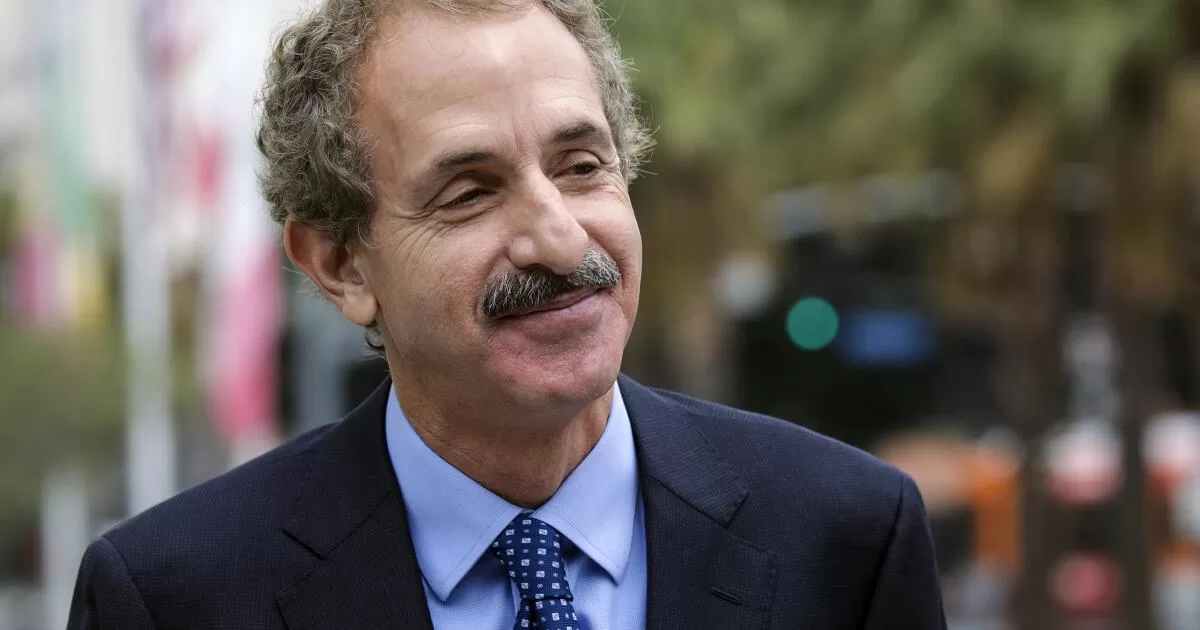The Times and Consumer Watchdog had requested the documents to better understand the government’s criminal case and whether former City Atty. Mike Feuer bore any culpability for a scandal involving a sham lawsuit and an extortion plot. Feuer has long denied wrongdoing.
In a tentative ruling, U.S. District Judge Stanley Blumenfeld Jr. said the documents, which consist mainly of dozens of search warrants filed during the government’s investigation, will be unsealed, with personal data redacted.
The names of public officials, along with individuals who are “wrongdoers,” will not be redacted, Blumenfeld said at a hearing Friday — a blow to prosecutors who had sought to keep the officials’ names from the public.
The Times and Consumer Watchdog are expected to work with the U.S. attorney’s office to ready the documents for release in the coming weeks.
Much of Friday’s hearing centered on Feuer and whether an FBI agent’s alleged assertions that Feuer lied to a grand jury and lied to the FBI should be redacted.
The FBI agent’s purported comments, made in an affidavit for a search warrant, were revealed in court by a defendant, Paul Paradis, at his sentencing in November.
Paradis, a former attorney turned cooperating witness for the federal government, pleaded guilty to accepting a nearly $2.2 million kickback from another attorney working on the DWP case and was sentenced to 33 months in prison.
Paradis had ingratiated himself at City Hall, befriending top city officials. An outside lawyer from New York, he was retained by Feuer’s office to help with litigation related to the DWP, then went on to secure separate contracts at the DWP.
Later, he secretly recorded high-ranking city officials and was present when armed agents raided the home of DWP general manager David Wright, who is serving a six-year sentence after conspiring to give Paradis a lucrative contract.
Jerry Flanagan, an attorney for Consumer Watchdog and The Times, told Blumenfeld that the FBI agent’s comments amounted to an “opinion” that wasn’t subject to federal rules that require grand jury information to be kept confidential. Flanagan also argued that the “cat is out of the bag” because Paradis had publicly revealed the alleged comments.
Blumenfeld appeared concerned about protecting the secrecy of the grand jury process and said he would rule later on the issue.
Feuer has said he had no knowledge of any crimes. In a 2022 letter, the U.S. attorney’s office told Feuer that he wasn’t a target in their criminal investigation.
When asked by The Times last November about the FBI agent‘s alleged statements, Feuer pointed to the 2022 letter.
Feuer also told The Times last year that he gave the U.S. attorney’s office his phone in 2020, but investigators did not search his home or office.
A former state assemblymember and L.A. City Council member, Feuer ran for L.A. mayor in 2022 but dropped out shortly before the primary. Last month, he finished fourth in the primary for the congressional seat being vacated by Rep. Adam B. Schiff.
The 1,400 pages of search warrants and other documents requested by The Times and Consumer Watchdog were issued between 2019 and 2021.
Court filings by prosecutors in the criminal case make clear that some individuals, including city officials who remain anonymous in the filings, took part in or were aware of various schemes.
Only four people were ultimately charged, and prosecutors said that their case concluded last year.
The criminal prosecution centered on a 2015 class-action lawsuit brought by DWP customers over massive errors caused by a new billing system at the utility.
The lawsuit was covertly written by Paradis, then working for Feuer’s office, who handed the suit to an outside attorney to file against the city.
The goal, according to prosecutors, was to settle all the claims by various DWP customers on terms advantageous to the city.
Prosecutors also uncovered other unethical and illegal schemes, including an illicit payment involving the city attorney’s office.
Blumenfeld said at Friday’s hearing that he expected the name of one person, Julissa Salgueiro, to remain unredacted in the search warrants and other documents.
“Ms. Salgueiro is a quintessential wrongdoer,” Blumenfeld said, describing why her name should be unredacted.
Prosecutors have never named or charged Salgueiro, but their court filings refer to a former employee of a Beverly Hills law firm who threatened to reveal the city’s collusive lawsuit over the DWP billing errors.
The employee had “stolen or improperly retained” documents showing the collusive lawsuit and demanded money for their return, prosecutors said in court documents.
Thomas Peters, a top aide to Feuer, was charged with aiding and abetting extortion after being ordered by unnamed city staff to take care of the employee’s threats, according to prosecutors. Prosecutors never charged any other senior staff members from the city attorney’s office.
After pleading guilty, Peters was sentenced to nine months home detention and ordered to pay a $50,000 fine.
Salgueiro’s attorney, William Pitman, told The Times on Friday that he “respectfully disagrees with Judge Blumenfeld’s opinion.” His client has never been charged, indicted and has no criminal history, he said.
“With regard to the unsealing motion, Ms. Salguiero was never notified [of the case],” said Pitman.
